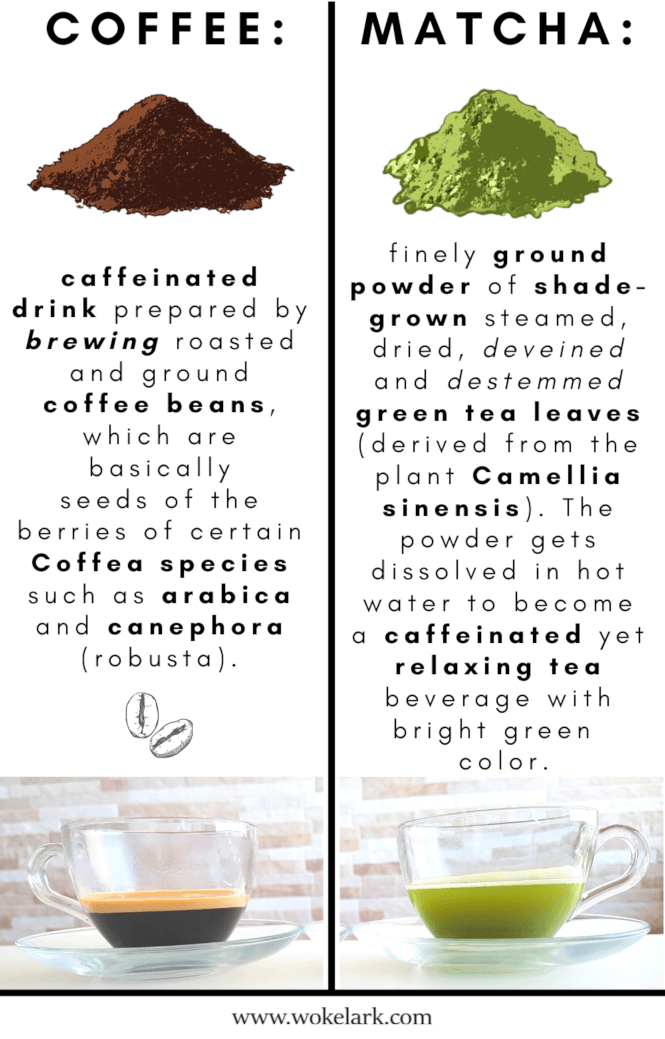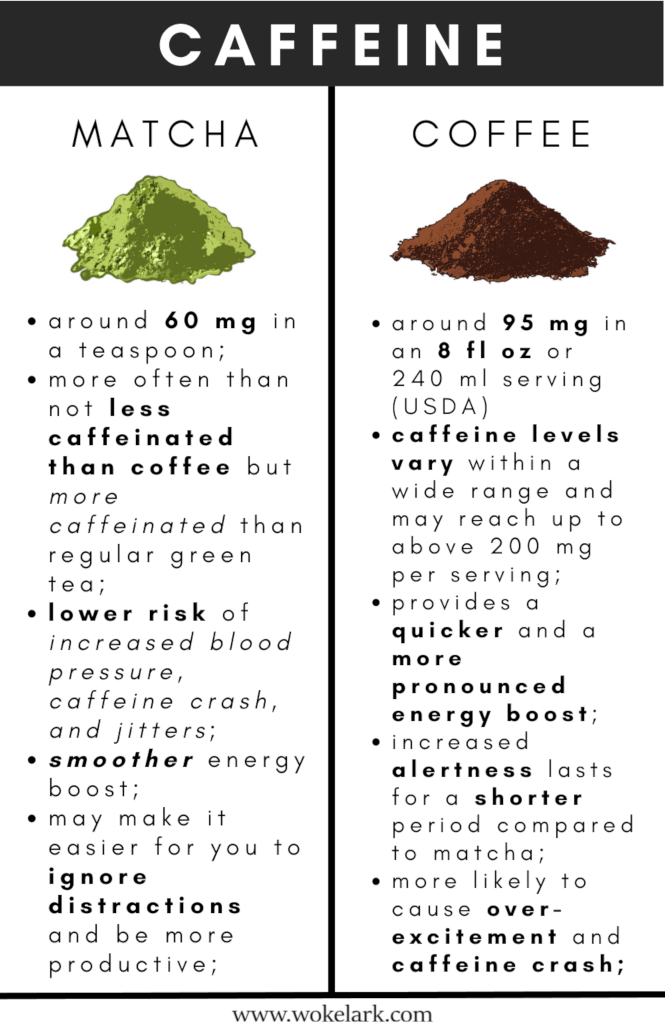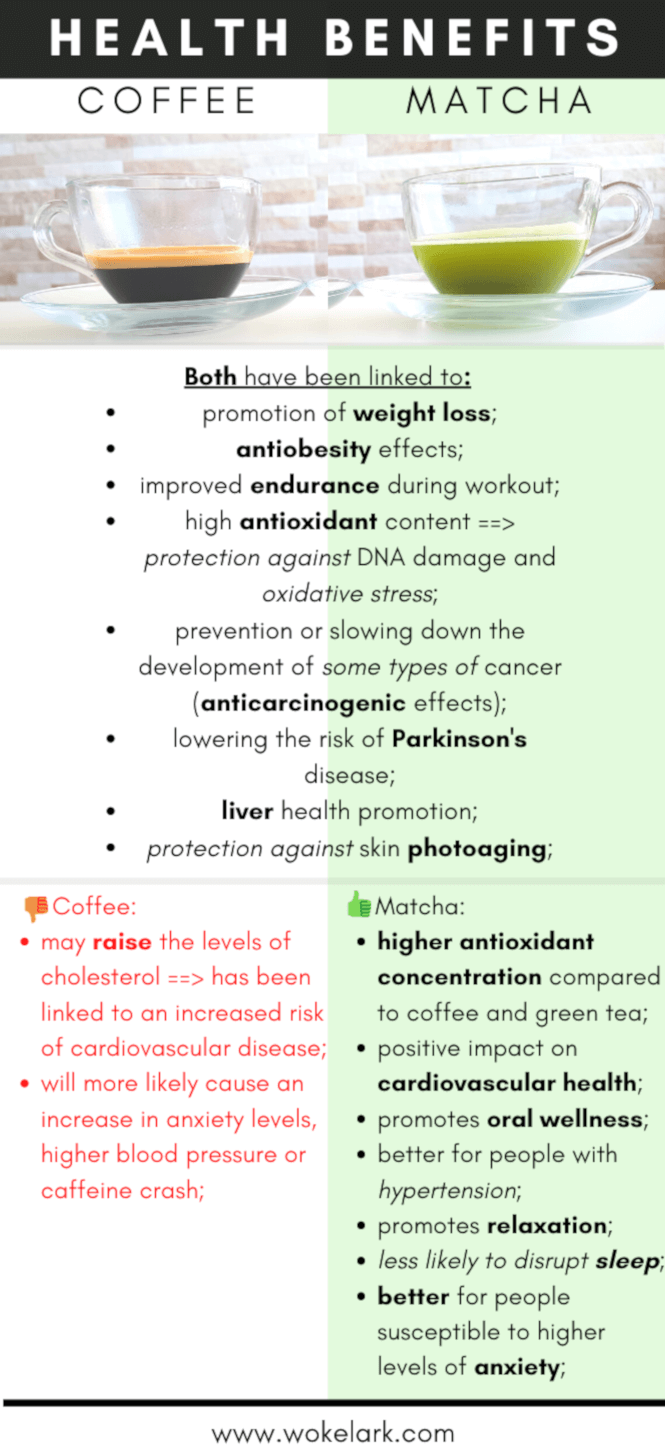
Even if you’re a faithful coffee lover like I am, you should definitely widen your horizon and consider trying out matcha.
It’s gaining popularity for a reason and nowadays you can get a matcha-based latte in virtually any coffee shop.
But do you know what matcha is and whether it has anything to do with green tea? How does it compare to coffee in terms of caffeine and potential health benefits?
Before we move on to the side-by-side comparison, check out the following infographic and see the basic definitions of matcha and coffee:
Matcha versus Coffee – A Comprehensive comparison
Both matcha and coffee contain caffeine and can boost our alertness.
A cup of coffee is usually more caffeinated than a cup of matcha, but because the latter contains L-Theanine, it will elevate your energy levels in a smoother way. The L-Theanine in matcha has relaxing properties and makes this type of tea a better alternative to coffee for people with increased anxiety levels or a stressful day to day life.
Matcha is also less likely to cause an increase in blood pressure, a caffeine crash, or caffeine jitters than coffee, so it might keep you awake for longer.
Both matcha and coffee contain beneficial bioactives that have been linked to a number of health benefits.
However, matcha is richer in antioxidants when compared to coffee.
That being said, the coffee and matcha’s numerous benefits and possible disadvantages are still being investigated by scientists so that one day we can get a proper understanding of their influence on our health.
In the following sections, I make a detailed side by side comparison between matcha and coffee in terms of their caffeine content, function on our cognitive performance, antioxidant activity, potential benefits, and acidity levels.
All the information has been gathered after thorough research and it’s based on published scientific reports.
What I found is quite intriguing, so I recommend reading through the rest of this Woke Lark article, as by the end of it you’ll most likely be able to tell which one is better for you – matcha or coffee.
Caffeine differences of matcha and coffee
The active ingredient in coffee that we highly value for its energizing properties is caffeine.
Matcha does contain caffeine too – around 30 milligrams in half a teaspoon, which is the serving size recommended on most Matcha green tea packages.
Nevertheless, many consumers tend to add a full teaspoon to their matcha lattes and smoothies instead, which results in a drink that contains around 60 milligrams of caffeine.
In comparison, according to the USDA, a shot of espresso contains 63.6 mg of caffeine, and 8 fl oz (240 ml) of brewed coffee – 95 milligrams.
They depend on several variables such as the amount of green powder used for a tea serving, the type of coffee beans, their roast profile, and the brewing method utilized during the process of coffee extraction.
For example, according to this study during which the caffeine content of coffee samples obtained from coffee shops was evaluated, the caffeine levels were found to be within a wide range from 58 to 259 mg per dose.
That being said, it’s safe to say that, more often than not, a cup of matcha tea contains less caffeine compared to a cup of coffee. However, this doesn’t mean that matcha green tea won’t be able to wake you up and improve your alertness and energy levels in the morning.
While both matcha and coffee are caffeinated, the former contains an important amino acid called L-theanine (or Theanine) that affects the way caffeine works on us.
For example, coffee consumption is related to an increase in the blood pressure mainly because of its caffeine content.
There is evidence that Theanine reduces this undesired effect of caffeine on blood pressure, without decreasing its ability to improve our cognitive function.
This means that the combination of caffeine and L-theanine in matcha green tea will wake you up smoothly without making your heart race and will likely reduce the chances of caffeine jitters.
It’s also worth noting that there are scientific reports that suggest that L-theanine in combination with caffeine enhance our ability to remain focused on a current task and ignore distractions.
This is a highly appreciated advantage of matcha green tea for many who are comparing it to coffee.
Being able to stay focused is something that we all want, but only a few of us can easily achieve.
I don’t know whether it’s the placebo effect or not, but it feels like after having matcha or green tea instead of coffee, it’s easier for me to ignore distractions and be more productive and disciplined at work.
In other words, even though coffee usually has more caffeine compared to matcha, the former doesn’t contain L-theanine which has a number of beneficial effects on our mood and cognitive performance.
Health Benefits comparison
If you’re trying to choose which one is better: matcha or coffee, you have to take into consideration their potential benefits.
Both of these caffeinated drinks have been linked to quite a few health-promoting effects that are worth noting in this side-by-side comparison.
Matcha and coffee contain antioxidants and other bioactives that have a positive impact on our well-being.
As we already know, one of these bioactive compounds that they both contain is caffeine.
Apart of its energizing properties, there is evidence that caffeine may also boost metabolism and fat burning.
This is why many weight loss supplements contain caffeine.
If you’re trying to lose weight, the caffeine that both matcha and coffee contain may also improve your endurance during workout.
There is also evidence that caffeine reduces the rates of perceived exertion during exercise.
So if you’re trying to lose weight, it’s a good idea to have a cup of matcha green tea or a cup of freshly brewed coffee about 30 minutes before workout, as the caffeine they contain will most likely improve your physical performance.
The thing is that over time you may build up tolerance to caffeine, which will reduce its positive impact on your workouts.
The effect of caffeine also varies from one person to another, because of the difference in caffeine metabolism among different individuals.
Matcha green tea contains polyphenols such as catechins that may induce weight loss by altering the gut microbiota (1, 2).
Catechins are actually powerful antioxidants that are found in green tea leaves. So by having green, black, or oolong tea you are also ingesting these beneficial polyphenols.
The thing is that a cup of matcha is much richer in catechins because we make it by dissolving the entire ground green tea leaf in hot water.
If you have a cup of regular green tea some of its beneficial compounds won’t leak into the water during infusion and will inevitably go to waste.
When it comes to its antiobesity effects, some studies suggest that green tea catechins may influence the sympathetic nervous system’s activity and promote the oxidation of fat.
So when it comes to weight-loss, it seems like matcha may be a step ahead of coffee.
Since obesity has been linked to an increased risk of type 2 diabetes (T2D), the antiobesity effects of matcha contribute to a lower risk of T2D development in individuals that consume this green tea powder on a daily basis.
On the other hand, coffee consumption has been linked to a decreased risk of type 2 diabetes too, not only because of its caffeine content, but also because of its other bioactive compounds such as cafestol and chlorogenic acid.
Cafestol and kahweol are actually diterpene compounds found exclusively in coffee plants and contribute to its bitter taste.
These coffee components have been linked to coffee’s potential anticarcinogenic effects.
It’s worth noting that Arabica beans contain twice as much cafestol compared to Robusta beans. Kahweol is also hardly present in Robusta coffee beans. So the type of coffee you use plays a large role in the potential health benefits of your cup.
This is why daily consumption of brewed unfiltered coffee has been linked to an increased risk of cardiovascular disease.
Many people have switched to filtered coffee since the paper filters trap the diterpenes and keep them out of your cup. Chemex filters are quite efficient at doing that.
As I already mentioned, matcha is rich in a type of phenolic compound called catechins which are powerful antioxidants. Unlike coffee consumption, green tea consumption has a positive impact on cardiovascular health because of these beneficial polyphenols.
The most abundant catechin in green tea is epigallocatechin gallate (EGCG) and there is evidence that it has anticarcinogenic properties too.
There’s also proof that the concentration of EGCG available from drinking matcha is 137 times greater than the amount of EGCG available from China Green Tips green tea, and three times higher than the largest literature value for other green teas.
So matcha is definitely an excellent source of catechins which are highly beneficial for our health.
Photo by NipananLifestyle.com from Pexels
There are also scientific reports that suggest that along with EGCT, another green tea compound called quercetin may also prevent or slow the development of some types of cancer.
Apart from coffee’s cafestol and kahweol, the chlorogenic acid in coffee has been linked to the anticarcinogenic effects of coffee too.
Actually, the Chlorogenic acid has a wide range of potential health benefits that are worth noting in this matcha and coffee comparison.
Not only has it been suggested that it has anti-carcinogenic and anti-diabetes impacts, but it’s also a powerful antioxidant that’s been linked to anti-inflammatory and anti-obesity properties.
Regular coffee and caffeine intake has also been associated with a lower risk of Parkinson’s disease (3, 4). Matcha green tea contains caffeine too, so it does make sense that it might lower the risk of this disease too. The potential role of the previously mentioned green tea L-Theanine on Parkinson’s disease theurapeutics is also being investigated, as there’s scientific proof that it may be highly beneficial in such a context.
Coffee and matcha have also been associated with beneficiary effects on liver health. There are some studies which suggest that coffee consumption is related to a lower risk of cirrhosis. Green tea intake has also been linked to a lower risk of liver disease. So both matcha and coffee can be beneficial for your liver.
When it comes to oral health, there’s clearly a winner in this matcha versus coffee battle. Coffee can stain your teeth and may cause halitosis (bad breath).
On the contrary – green tea has been linked to prevention of dental caries, periodontal diseases and halitosis. Green tea catechins may also prevent cavities, strengthen tooth enamel, reduce plaque and bacteria and prevent bad breath (5). There are quite a few studies that confirm the beneficial properties of green tea on oral wellness. So when it comes to oral health, matcha seems to be a better choice compared to coffee.
Nevertheless, there is some evidence that coffee may prevent the formation of caries too if consumed alone (without additives).
Along with its other health promoting effects, green tea polyphenols have been associated with protective effects against skin photoaging. Coffee consumption has also been linked to similar effects because of its own polyphenols.
Because of its L-Theanine content, matcha doesn’t raise the blood pressure the same way coffee does. At the same time – it does contain caffeine which has a positive impact on mood and productivity. So matcha may be a better energizing alternative to coffee for individuals who suffer from hypertension.
Proof exists that L-theanine may also be helpful at improving our ability to manage stress and anxiety levels.
Furthermore – a scientific report suggests that 40 minutes after oral administration of Theanine, α-waves were generated on the brain surface.
The generation of alfa waves is considered to be an index of relaxation. This might be the reason why matcha is pretty good at boosting our alertness through its caffeine, and at the same time – increasing our ability to avoid distractions and remain focused. Its Theanine doesn’t let us get overexcited and helps concentrate the caffeine powers on completing a current task.
It’s overall safe to say that coffee has a worse reputation than matcha when it comes to its anxiety management properties.
While some scientific reports do suggest that caffeic acid (present in coffee) when combined with caffeine may reduce anxiety levels, high coffee consumption is usually associated with increased levels of anxiety.
On top of its other relaxing properties, matcha green tea is less likely to disrupt sleep compared to coffee.
Sleep deprivation is related to a higher risk of anxiousness.
Therefore Matcha is an overall better alternative to coffee for those who are exposed to stressful events and/or are susceptible to higher levels of anxiety.
Here’s the summary of matcha and coffee’s health benefits compared side by side:
Coffee versus Matcha: Acidity
When it comes to acidity, coffee is more acidic compared to matcha with ph values ranging between 4.85 and 5.13. Matcha is alkaline with ph values of around 9.
So if you have a sensitive stomach and you’re looking for a less acidic caffeinated morning drink, matcha green tea is a better option compared to coffee.
However, if you have GERD (gastroesophageal reflux) having matcha or coffee might trigger your symptoms because of their caffeine content.
It’s been suggested that caffeine may relax LES (lower esophageal sphincter) and cause unpleasant reflux symptoms.
Still, matcha does usually contain less caffeine than a cup of brewed coffee, so it may be considered a better alternative.
- Does matcha go bad: Shelf life & Proper Storage Explored
- How long do coffee beans last: Green, Roasted, Whole & Ground. In this guide you will also find out how to store coffee in a way to preserve its freshness for longer.
Over to you
Now you know how matcha compares to coffee in terms of caffeine, health benefits, and overall effect on our body.
What I haven’t touched on yet is flavor, but whether you like one or the other comes down to personal preference.
Matcha does seem to have an unusual flavor for people that are used to the western diet, and not all regular coffee drinkers are fond of its specific taste.
I personally love matcha, especially if I get my hands on a ceremonial grade container. I switch my coffee with it every once in a while, especially when I feel like my anxiety levels are on the rise.
For those who can’t seem to enjoy matcha’s flavor, or have bought a culinary grade package and their tea doesn’t taste good on its own, I recommend checking out this matcha latte recipe.
There are actually quite a few ‘how-to’ matcha guides here on the Woke Lark that you can easily use, and take advantage of this green tea powder’s benefits.
With all being said, matcha and coffee are both a great way to start your day.
Leave me a comment below to share your thoughts or questions. Did you learn something new?





Excellent article–I will be sharing it with family, friends, and my co-workers. I like Matcha and due to my high blood pressure I will be switching to it today. :
Very interesting, I’m a coffee lover but have recently switched to matcha for health benefits and anxiety. I’m a week in and can genuinely say I love matcha the taste and the feeling I get from it. Thanks for sharing your comparison of the two.
Rachael
Thank you, Rachael, for leaving this comment. Every once in a while, I make the switch from coffee to matcha and it really helps me to manage my anxiety better. I enjoy the taste of matcha too, but to be honest, I always go back to coffee. Anyway, I’m glad that you found my article useful. Take care, Rachael!
Rachel and Vessy,
I’m a coffee lover too, but would like to try matcha tea – do either of you have a favorite brand to try and is the powder better than tea bags? Thank you.